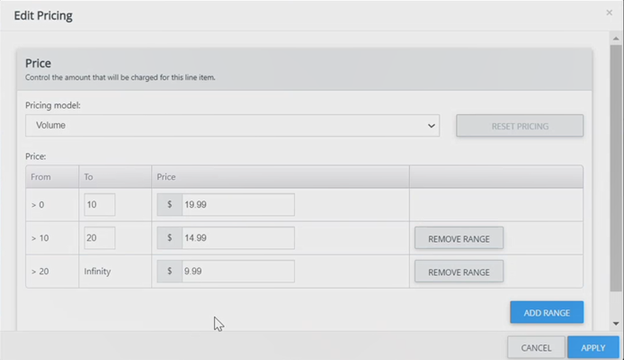Imagine you’re a subscription business that provides highly customized solutions to its customers. For every account, your sales team crafts a unique contract to meet each customer’s specific needs.
This model is highly beneficial to your customers, but also very complex to manage on the backend.
Many business owners in this position would assume billing automation isn’t the simple option in this scenario. With no two subscriptions exactly alike, there may appear to be no way around performing at least some manual billing work at every billing cycle.
However, as more customers open accounts and the subscription business scales, manual billing quickly becomes untenable. At this point manual billing processes even put a business at a competitive disadvantage.
Thankfully, automation is an option. In fact, it’s an imperative.
From the simplest subscription business model to even the most complex in terms of pricing and particulars, the right automated billing software can optimize the billing process. It can digitally transform your financial operations and enable your business to scale and innovate without limitations.
Here’s how.
Flexible catalogs come from product-centered logic
In a bid for simplicity, many billing software providers build their platforms around plans or subscriptions—not the products within those plans and subscriptions. This makes it easy to create and sell plans, but difficult or impossible to customize those plans at the customer level.
For subscription businesses with more complex clients or contracts with uniquely negotiated terms, that’s a major limitation and a drag on digital transformation.
These businesses need more granular control of the items within each customer’s subscription and the ability to automate whenever possible.
To achieve that, the best subscription billing software uses logic that lives at the product level.
- Ideally, the business creates a catalog of products on its billing platform.
- Then those products are grouped into plans.
- These plans serve as subscription templates that aren’t set in stone—each product can still be altered within the template.
With this approach, true subscription catalog flexibility is achieved and businesses can create and automate billing for extremely customized subscriptions without having to generate a brand-new plan or subscription for every client or customer.
Customers get all their unique needs met, and your business doesn’t have 300+ unique plans to manage.
Let’s explore how this works.
1. Tailoring individual subscriptions with adaptive automated billing software
Stax Bill is a modern billing platform with product-centered logic.
When a customer is linked to a plan, that relationship becomes a subscription. Because each product within that plan is still its own entity in the system, the subscription is completely customizable at multiple levels.
Businesses can apply coupons and edit the pricing, billing frequency, service dates, and even the name and description of the subscription as it will appear on a customer’s invoice. And making these changes to a customer subscription doesn’t affect the general plan or template; the changes only apply to that customer’s account.
Not only can a business easily alter an individual subscription’s terms, but it can also add, remove, and make similar changes in pricing, service dates, and descriptors to the individual products within that subscription. This includes adjusting charges and terms for:
- one-time
- recurring, and
- physical good sales that may all occur within one subscription and require specific frequencies, end dates, etc.
Impressive, right? It goes further.
Businesses can even change the pricing model all the way down to individual products.

This is a level of customizability not every billing platform has.
If your subscription business model requires granular catalog flexibility such as this, be sure to ask about it when you’re determining which automated billing software provider is best for you.
2. Automate even the most complex variable pricing models
No matter your subscription model or pricing strategy, product-centered logic makes it possible for a billing platform to automate every single customer subscription regardless of complexity.
3. Satisfy the full gamut of your subscription business’s needs
Need an annual recurring fee in addition to bi-monthly fees and usage charges, with an occasional one-time charge for spot services? No problem.
Selling hardware up front and using hybrid pricing to cover usage and service that can be turned on and off?
It’s all covered with the right billing solution.
Price packaging agility is critical for scaling in an age of rapid digital transformation.
So many businesses with contract-based pricing, unique models, usage thresholds, and discounts have to go all the way back to their catalog and build completely new plans for each customer.
With product-centered logic, you don’t have to do that. Simply pick the plan the new contract is based on and edit it for just that customer without affecting the entire catalog.
For businesses where every single customer is unique thus creating the most complex billing scenario possible, this approach is really the only option for automation.
When it’s impossible to create tiers or plans, the business model is not truly product-centered.
4. Granular flexibility means better financial reporting
Not only does financial software centered around products make automated billing for complex scenarios a snap, it also drastically improves reporting.
Imagine trying to derive usable data and insights from a platform with dozens or even hundreds of unique plans tailor-made for specific customers?
Nah.
With an adaptive billing solution though, every customer still falls under a set plan’s template, even if their own subscription has some changes made to it.
What’s more, the product-centric nature of such a billing platform means business leaders can not only determine revenue by customer and plan, but even by product.
That’s something many billing platforms can’t do well.
With the right automated billing software, each product can have its own general ledger code, and all revenue can be mapped back to a chart of accounts.
Business leaders can create and monitor cohorts and bundle similar products and services across plans for review, gaining new insights they may never have had before.
What if my subscription business model isn’t that complicated?
Even if the solutions your business provides its customers aren’t deeply customized, having a flexible catalog is still a huge benefit.
Just because you don’t need to create unique subscriptions for each customer doesn’t mean you won’t need to evolve your plan options over time to meet your customers’ changing needs and to compete with the market at large.
The right subscription billing solution makes it easy for you to adjust everything from your price point and pricing model to the products and services included in your plans and how your customers will be billed for them.
It’s also a competitive advantage to have the capacity to customize deeply as needed as your business grows. After all, rapid changes in the market often require unexpected pivots.
Automated billing in the modern age
As digital transformation continues its light-speed course, subscription businesses need to leverage agile financial technology that quickly adjusts to changes in customer needs.
This level of flexibility in billing is only achievable with software that treats products as their own entities, providing a more granular level of control.
This agility provides your business with a competitive advantage in terms of meeting evolving go to market needs with quick go-to-market capabilities.
With the right billing software, even the most unique contract-based clients are automatically billed and reported on, paving the way for subscription businesses to scale regardless of their model’s complexity.








